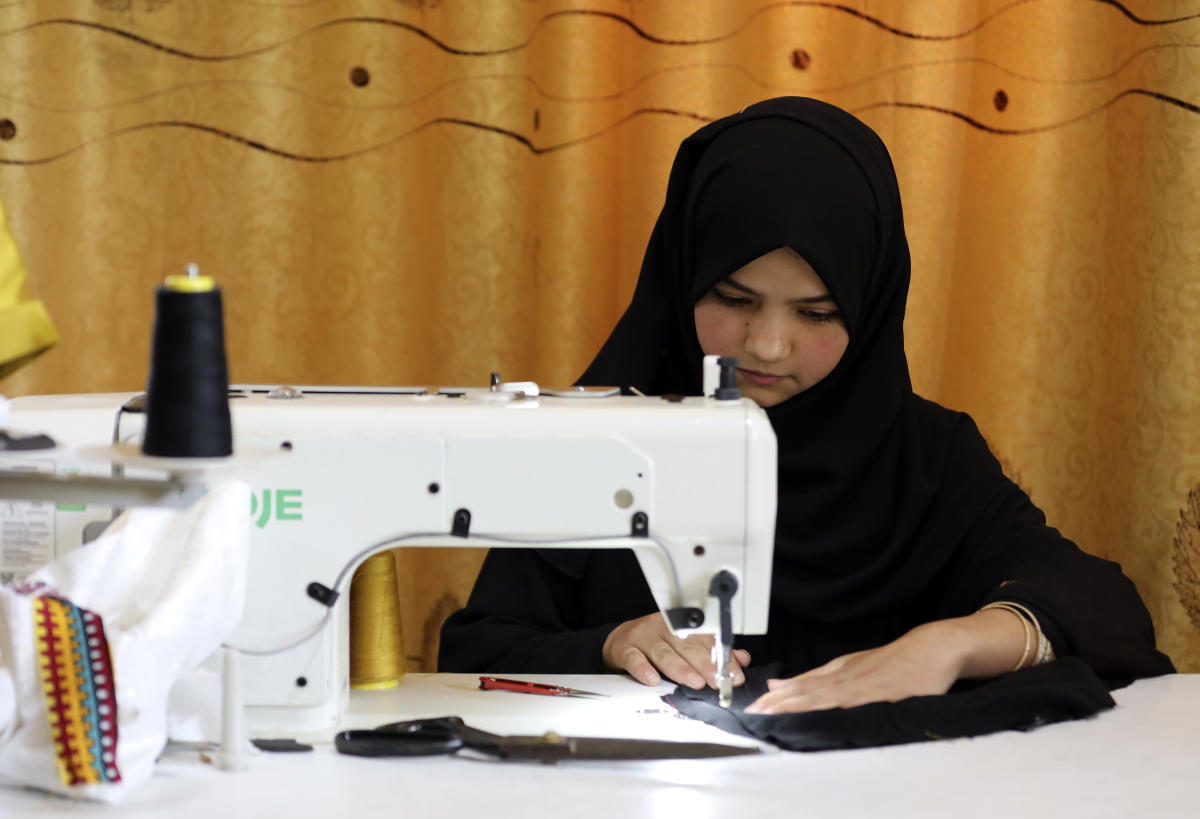KABUL, Afghanistan (AP) — Frozan Ahmadzai is one of 200,000 Afghan women who have been granted permission to work by the Taliban. She was supposed to graduate from college this year to pursue her dream of becoming a doctor, but the Taliban have barred women from higher education and banned them from many jobs.
Now, instead of stitching, she sews in a basement in Kabul. Instead of administering medicine, she makes pickles.
Half of Afghanistan’s population has lost the right to work, while the country’s economy is worse than ever.
Few jobs are available to women, such as tailoring and food preparation, which Ahmadzai, 33, now does alongside women who were once teachers or aspired to be.
Women’s participation in the labor market in Afghanistan, always limited by conservative cultural beliefs, was 14.8% in 2021, before the Taliban seized power and imposed severe restrictions on women and girls. They included banning female education after the sixth grade, banning women from public spaces such as parks, and enforcing dress codes.
According to World Bank data, women’s labor force participation had fallen to 4.8% in 2023.
Ahmadzai’s eyes light up when she talks about the new reality for Afghan women. “We’re just looking for a way to escape,” she said, referring to working in the basement. It’s certainly a step up from being cooped up at home.
But profits are meager for her and her 50 colleagues in the collective. In a good month, the pickle and tailoring businesses bring in about 30,000 afghanis ($426).
The women also have other complaints that everyone in Afghanistan knows: rent and utility bills are high. Sewing machines are old-fashioned. Electricity is irregular. Local shopkeepers do not compensate them fairly. They receive no support from banks or local authorities to grow their businesses.
Just getting permission from the Taliban to work is a challenge for women, even though the work permit process should be the same for both genders under Afghan labor laws.
The ministry responsible for issuing permits has banned women from its premises and set up a women-only office elsewhere. It is to “speed things up and make things easier” for women, said a spokesman for the Ministry of Labor and Social Affairs, Samiullah Ebrahimi.
There, women hand in their papers, including their national ID, a covering letter, and a health certificate from a private clinic. That’s assuming they have the documents, along with the money to cover any expenses. It also assumes they can move around without being harassed if they’re not accompanied by a male guardian.
Last year, a senior United Nations official said Afghanistan had become the world’s most repressive country for women and girls. Roza Otunbayeva, head of the UN political mission in Afghanistan, said that while the country was recovering from decades of war, half of its potential doctors, scientists, journalists and politicians “had been locked in their homes, their dreams crushed and their talents confiscated.”
The Taliban have a different vision. They have tried to provide women with a “safe, secure and separate” work environment in line with Islamic values and Afghan traditions in sectors where women’s work is needed, ministry spokesman Ebrahimi said. They can work in retail or hospitality, but it must be an all-women environment.
He said women do not need a degree for most permitted jobs, such as cleaning, security checks, handicrafts, farming, tailoring or food production.
It is heartbreaking for Ahmadzai and her colleagues to see their expertise go unused. Several were also training to become make-up artists, but beauty salons are closed.
Some jobs for women remain in education and health care, so Ahmadzai has switched to nursing and midwifery training so she can become a medical professional. But not a doctor. The Taliban don’t want any more female doctors.
The challenges Afghan women face are obeying Taliban decrees and supporting their families, while living conditions are deteriorating, putting pressure on their health, including mental health.
Ahmadzai said one of the few positive things about working in the basement in Kabul is the camaraderie and support system there.
“Afghan women today all have the same role in society. They stay at home, take care of the children, do the housework and don’t work hard,” she said. “If my family didn’t encourage me, I wouldn’t be here. They support me because I work. My husband is unemployed and I have small children.”
Salma Yusufzai, head of the Afghan Women’s Chamber of Commerce and Industry, acknowledged that working under Taliban rule is challenging.
The chamber has nearly 10,000 members, but the lack of female representation within the Taliban-controlled government poses a challenge.
Yusufzai said the chamber supports women by providing them a platform in local markets and connecting them with the international community for participation in foreign exhibitions and other opportunities.
Members of the House include key Afghan industries such as carpets and dried fruit. The businesses are owned by men but kept alive by women who want to support the economy, which she says would collapse without them.
She acknowledged that the chamber’s limited work was only possible through cooperation with the Taliban: “If I close the door, nothing happens and nothing remains.”
Yusufzai once owned three gemstone companies and gave them up because of her role in the chamber. But she can’t own them under the Taliban regime anyway, so the companies are in her husband’s name.
“Because we live in this country, we have to follow the rules,” she said, her smile tight.
“It is better to have something of nothing.”







